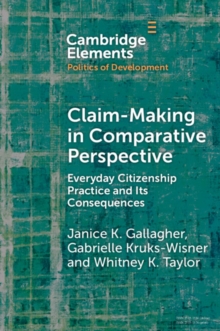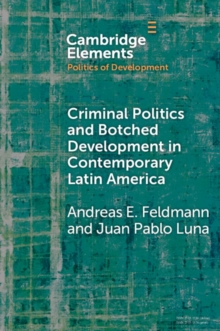
Coercive Distribution Paperback / softback
by Michael (University of Chicago) Albertus, Sofia (Bryn Mawr College, Pennsylvania) Fenner, Dan (University of Michigan, Ann Arbor) Slater
Part of the Elements in the Politics of Development series
Paperback / softback
- Information
Description
Canonical theories of political economy struggle to explain patterns of distribution in authoritarian regimes.
In this Element, Albertus, Fenner, and Slater challenge existing models and introduce an alternative, supply-side, and state-centered theory of 'coercive distribution'.
Authoritarian regimes proactively deploy distributive policies as advantageous strategies to consolidate their monopoly on power.
These policies contribute to authoritarian durability by undercutting rival elites and enmeshing the masses in lasting relations of coercive dependence.
The authors illustrate the patterns, timing, and breadth of coercive distribution with global and Latin American quantitative evidence and with a series of historical case studies from regimes in Latin America, Asia, and the Middle East.
By recognizing distribution's coercive dimensions, they account for empirical patterns of distribution that do not fit with quasi-democratic understandings of distribution as quid pro quo exchange.
Under authoritarian conditions, distribution is less an alternative to coercion than one of its most effective expressions.
Information
-
Out of StockMore expected soonContact us for further information
- Format:Paperback / softback
- Pages:75 pages, Worked examples or Exercises
- Publisher:Cambridge University Press
- Publication Date:25/04/2018
- Category:
- ISBN:9781108462136
Information
-
Out of StockMore expected soonContact us for further information
- Format:Paperback / softback
- Pages:75 pages, Worked examples or Exercises
- Publisher:Cambridge University Press
- Publication Date:25/04/2018
- Category:
- ISBN:9781108462136



